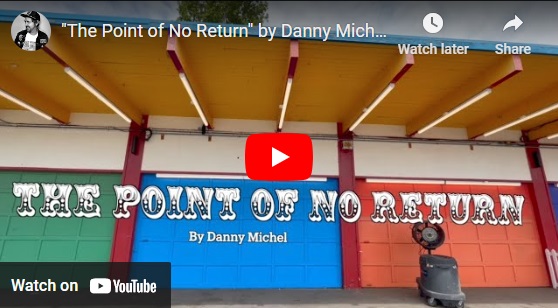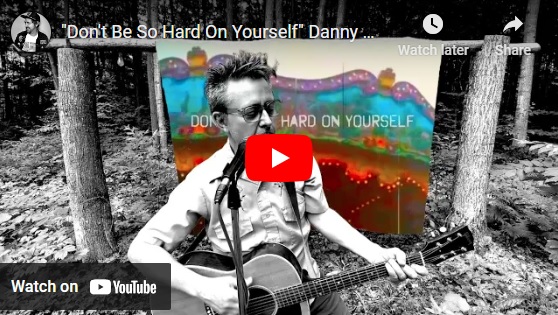Longtime, critically-acclaimed, resolutely independent DIY singer-songwriter Danny Michel is one of the most engaging storytellers you’ll ever see live – both in his songs, and his onstage conversation.
There’s the story he tells about how he affectionately “stole” his fellow singer-songwriter/tourmate/one-time co-writer Steve Poltz’s song “A Brief History of My Life,” tweaking it to make it his own – including the guiding light of the Schneider’s sign on the 401 highway, near his hometown of Kitchener. Or the one about how he used to dread having to sing the word “griddle” in his song “Tennessee Tobacco” when playing it live, only to buy a stove that happened to include one; now he loves it. Or the one about how his environmental warning song “Feather, Fur, and Fin” resulted in him performing for leading global chimp researcher Jane Goodall at her 85th birthday party, which concluded with them in a chimpanzee hug, then drinking whiskey together on her hotel room bed.
Performing solo, in whatever genre suits the song, Michel leads audience singalongs, plays captivating riffs on his electric guitar, stays present to respond to all that happens in the moment, and greets attendees who’ve travelled to see him. All of which seems grounded in an appreciation of humankind.
Michel is hardly a careerist, but he’s enjoyed some traditional career highlights. He’s earned multiple nominations for JUNO Awards, listings for the Polaris Music Prize, and inclusion in CBC’s Heart Of Gold competition. He’s won a Canadian Folk Music Award for Producer of the Year, and the organization’s Pushing the Boundaries Award. One of his songs was fan-voted best of the year on the CBC Music Top 20 (more on that later).
Nonetheless, he’s had a fascinating career, with unique, real-life moments. Like meeting Goodall, environmental activist David Suzuki, and astronaut Col. Chris Hadfield – true honours for a youngster who grew up on science and nature. Or enjoying a decade of frequent live tapings across Canada with Stuart McLean, as he performed regularly on CBC’s The Vinyl Café radio program. Like recording an album in Belize, Black Birds Are Dancing Over Me, with Afro-Amerindian cultural group The Garifuna Collective, then playing a sold-out tour with them. Or founding the DM Ocean Academy Fund, which helps raise scholarships for a small, non-profit community high school in Belize – generating more than $125,000 so far. Like recording his Khlebnikov album in the Canadian arctic, aboard a Russian icebreaker, during an expedition curated by Hadfield. Or filming his online comedy/sci-fi/music show Dan’s Space Van, chatting with interviewees in his Star Trek-themed vehicle.
Of course, all this activity stopped during the pandemic, which at one point stranded Michel far from home. “I went down to New Orleans to play a gig,” he says. “Got COVID, missed the gig, and got stuck in a hotel for 12 days. And was not allowed to come back to Canada. And I had it bad. I was sleeping with my phone in my hand, going, ‘When am I going to call 911?’ I was really sick. At the hotel, no one would bring me food, and I was doing my laundry in the bathtub. It was the worst experience!” he laughs.
“I wasn’t liking anything I was writing. And even scarier, I didn’t have a real desire to write.”
During isolation, Michel also suffered a crippling bout of writers’ block. “I’d never even believed that writer’s block was real,” he says. “Until all of a sudden, it was just this panic: I wasn’t liking anything I was writing. And even scarier, I didn’t have a real desire to write. I thought, well, I’ve done this all my life, maybe I just need a break… I figured I’d miss it after awhile. But I was getting more freaked out because I wasn’t missing it. So I thought, ‘I need to force this.’” Michel became determined to work at it daily, slowly, even when it wasn’t fruitful. “Eventually, it just came back,” he says.
So, it wasn’t until June 30, 2023, that he released his first album in five years, Ghost Town. As befits such a huge fan of eternal changeling David Bowie, the album is as eclectic as Michel’s work has always been. Maybe more.
“I told myself when I was making this record, ‘Stop thinking about whether a song is too long to be on the radio, or if the chorus isn’t catchy enough. Just go full-out,’” he says. And he did, with some arranging and horn playing from frequent musical collaborator, the award-winning screen composer Rob Carli. For example, the solo in “The Point of No Return” goes from atmospheric twin clarinets, to a gentle piano break, and then to a loud, Robert Fripp-style electric guitar solo. In “Mermaids,” the instrumental part shifts from a xylophone-and-synth combo, into a highly unlikely, Disney-esque whistle break, then to twin clarinets again. “Nothing to Declare” boasts staccato horn fills near the beginning, then South-of-the-border brass, then a Nigerian juju music-style guitar lick after every verse. It’s ear candy, but it’s tasty, and it always serves the song.
The lyrics, perhaps appropriately, come from a darker, more vulnerable place than usual. “It was the pandemic, and I had all these sad tunes,” says Michel. “I kept thinking, ‘I don’t want to put that out.’ But I realized that a song is just a moment in time, and as soon as I finish writing that song, I’m not that same person. It’s just a snapshot of my life in this moment. So I thought, just put it all out on the table.”
Yet, even in the midst of such sad songs as “The Point of No Return,” which looks at unintentional self-sabotage; “Mermaids,” which suggests suicidal ideation; and “The Prison You Live In,” which lives up to its title, there are bright spots like “Lighthouse (The Wedding Song),” an acoustic ballad Michel wrote for the marriage of a music industry friend of his, Jude Coombe, of Starfish Entertainment; “Nothing to Declare,” a funky groove that partly celebrates the return of his songwriting; and his ebulliently hopeful pop-rock anthem, “Don’t Be So Hard on Yourself,” which in 2022 was voted by listeners as the CBC Music Top 20 No. 1 Song of the Year.
“In some weird way, that song was written to me, from me,” says Michel. “I’m so hyper-critical about everything I do. It’s kind of a self-help song for everybody. I get lots of messages from people, saying, “Thanks a lot, I start my day with that tune.’”
As a DIY music-maker who’s charted his own path, and succeeded on his own terms, Michel has one other piece of advice – for those trying to do the same. “Try things,” he says. “Experiment. If you can do it without spending a load of money, just go for it. If you fail, you’re still going to learn a bunch of things, guaranteed. Each time you fail, you learn a lot.”

